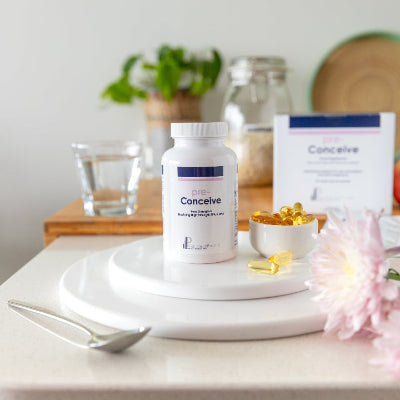Introduction
Preparing for IVF is a journey that requires patience, resilience, and hope. While medical science offers remarkable support, many couples want to know what they can do before treatment to improve their chances. One of the most powerful approaches is optimising egg and embryo health naturally, through nutrition, lifestyle, and targeted supplementation.
Why Egg & Embryo Quality Matters
IVF success depends on four crucial foundations:
- Healthy eggs capable of proper maturation and fertilisation.
- Strong sperm with good motility and DNA integrity.
- A healthy embryo that can implant in the uterine lining.
- A healthy environment for the embryo to grow.
Poor egg quality can lead to failed fertilisation, slow embryo development, or higher rates of miscarriage. While age is a strong factor, research shows that nutrition and lifestyle also influence egg and embryo health by reducing oxidative stress and improving mitochondrial function.
Nourish with Fertility-Friendly Foods
A diet rich in whole, nutrient-dense foods supports hormone balance, egg maturation, and embryo development. Key dietary principles include:
- Mediterranean-style diet: High in vegetables, fruits, legumes, whole grains, nuts, seeds, fish, and olive oil, linked to improved IVF outcomes.
- Protein balance: Include lean proteins such as fish, eggs, beans, lentils, and poultry.
- Healthy fats: Omega-3 fatty acids from salmon, sardines, chia seeds, and walnuts support cell membranes and hormone production.
- Antioxidant-rich foods: Berries, leafy greens, peppers, and tomatoes protect eggs from oxidative damage.
- Limit processed foods & sugars: These can drive inflammation and insulin resistance, which negatively affect fertility.
Key Nutrients for Egg & Embryo Health
Certain vitamins, minerals, and compounds have been studied for their role in reproductive health:
- Folate (B9): Critical for DNA synthesis and embryo development.
- Coenzyme Q10 (CoQ10): Antioxidant that supports mitochondrial energy in eggs, improving egg quality and embryo development.
- Vitamin D: Influences hormone balance and may improve IVF outcomes, especially if levels are low.
- Omega-3 fatty acids (EPA/DHA): Improve egg quality, reduce inflammation, and support embryo health.
- Zinc & Selenium: Support sperm and egg DNA integrity, hormone regulation, and antioxidant defence.
Lifestyle Strategies That Matter
Beyond nutrition, daily habits play a huge role in preparing for IVF:
- Manage stress: High stress can disrupt hormone balance; practices like yoga, meditation, and breathing exercises may help.
- Prioritise sleep: Quality sleep regulates melatonin, cortisol, and reproductive hormones.
- Exercise moderately: Gentle strength training, walking, or yoga boosts circulation and reduces stress without overstressing the body.
- Avoid toxins: Limit exposure to smoking, alcohol, pesticides, and endocrine disruptors (like BPA in plastics).
- Maintain healthy weight: Both underweight and overweight can affect ovulation and embryo quality.
When to Start Preparing
Eggs take about 90–120 days to mature before ovulation. That means the diet and lifestyle choices you make today can directly influence the eggs used in your IVF cycle three months from now. Starting a fertility wellness plan at least 3–4 months before IVF can help maximise results.
How Supplements Can Help
While food should always be the foundation, supplements can bridge nutritional gaps and provide concentrated support during IVF prep. Products like pre-Conceive are designed to supply a comprehensive blend of antioxidants, amino acids, vitamins, and minerals to support both male and female fertility.
Final Thoughts
Boosting egg and embryo health is about giving your body the best possible foundation before IVF. By focusing on a nutrient-dense diet, key fertility nutrients, healthy lifestyle habits, and smart supplementation, you can improve your chances of success and feel empowered in your fertility journey.
Remember: Every person’s needs are different, so always consult with your fertility specialist before starting new supplements or major lifestyle changes.
Some additional information can be found here at UCLA, and here at the British Dietetic Association for Women and for Men.






